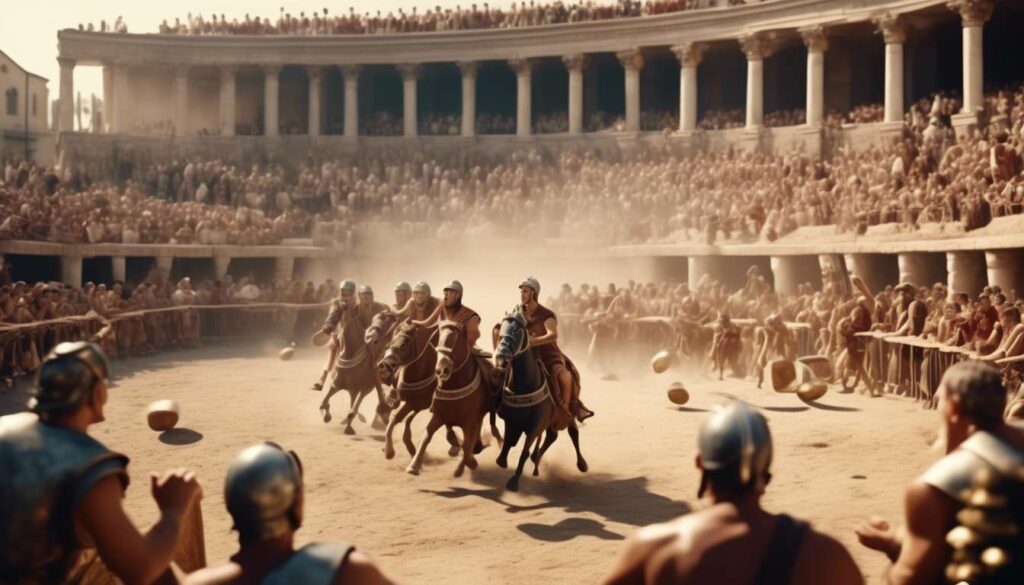As we delve into the fascinating history of sports betting, we embark on a journey that spans centuries, tracing back to when civilizations first began to wager on the outcomes of athletic contests. Our exploration reveals that the origins of sports betting are intricately woven into the fabric of human history, serving as a testament to our inherent desire for competition and the thrill of chance.
The earliest recorded instances of sports betting can be traced to ancient Greece, where spectators placed bets on the Olympic Games, and to the Roman Empire, where gladiatorial contests captivated audiences.
As we move through time, we discover how this pastime evolved across cultures and continents, adapting to societal changes and technological advancements.
By examining the roots of sports betting, we gain insight into how it has become the global phenomenon we know today, deeply influencing both the sports industry and the lives of millions worldwide.
Ancient Greek Origins
The origins of sports betting can be traced back to ancient Greece, where people placed wagers on athletic competitions like the Olympic Games. We can imagine the thrill and camaraderie shared among the spectators as they cheered on their chosen athletes. In these events, sports betting was a communal activity, bringing people together to share in the excitement and anticipation. This ancient history laid the groundwork for what would eventually become a global phenomenon.
As we journey through history, sports betting has evolved and expanded beyond Greece, demonstrating an early form of globalization. This widespread enthusiasm for wagering on sports reflects our innate desire to connect with others over shared interests and passions.
The gradual legalization of sports betting in various regions today echoes the acceptance it once had in ancient times, reinforcing our collective enjoyment of friendly competition.
By understanding these ancient beginnings, we find ourselves part of a long-standing tradition that brings people together across time and cultures.
Roman Empire Wagering
During the Roman Empire, sports betting flourished as spectators placed bets on chariot races and gladiator games, drawing immense crowds to the arenas. We can imagine the thrill of the crowd, united by a shared excitement and the anticipation of victory.
Sports betting wasn’t just a pastime; it was woven into the fabric of Roman society, offering a sense of belonging and camaraderie.
In ancient history, the practice of placing wagers was already becoming a significant cultural phenomenon. The Romans developed a sophisticated system that saw betting as a legitimate activity, hinting at an early form of legalization.
This acceptance and integration into daily life made sports betting an essential part of the Roman experience, setting the stage for its future spread across the globe.
As we reflect on the Roman Empire’s wagering traditions, we see the seeds of globalization in sports betting. The Romans’ passion for competitive events and gambling laid the foundation for a worldwide culture that continues to thrive today.
Medieval Betting Practices
During the medieval period, betting continued to thrive through various forms like jousting tournaments and animal fights, captivating both nobility and commoners alike. These age-old traditions brought communities together in shared excitement, laying the groundwork for betting as we know it today.
Our ancestors didn’t have the modern concept of legalization, yet these activities were widely accepted and even encouraged by rulers. They understood the social and economic benefits, which included:
- A sense of camaraderie
- Shared experiences of risk and reward
- Unity across different social classes, creating a sense of belonging
As globalization began to take shape, these medieval practices spread across regions, influencing betting customs far and wide. Early forms of betting served as a cultural bridge, connecting diverse communities through a common love for competition and chance.
Early American Gambling Culture
In early America, gambling quickly became a popular pastime, reflecting the adventurous spirit of a new nation. This thrilling activity connected us with ancient history, where betting had long provided excitement and camaraderie. Our ancestors, much like us, found joy in taking risks and predicting outcomes, weaving a rich tapestry of shared experiences that transcended generations.
The legalization of gambling in various states marked a significant shift. It created an environment where we could engage openly in these exhilarating activities. This legal acceptance fostered a sense of community as people gathered in saloons and betting halls, forming bonds over shared bets and lively discussions.
As globalization began to take root, our gambling culture expanded, drawing influences from across the globe. We welcomed diverse games and betting practices, which enriched our own traditions and deepened our sense of belonging. This cultural exchange strengthened our collective identity, reminding us that the thrill of the gamble is a universal language.
Industrial Revolution Influence
The Industrial Revolution dramatically transformed sports betting by introducing mass production of printed materials. This advancement allowed for the wider and more efficient distribution of betting information.
Before this era, sports betting relied heavily on word of mouth and handwritten notes to share betting odds and results. The introduction of newspapers and pamphlets marked a significant shift, enabling us to reach larger audiences.
This widespread distribution of information created a sense of community among bettors, who were eager to connect over shared interests and events.
As accessibility increased, the concept of sports betting began to gain more structure. This era marked the beginnings of a more organized system, laying the groundwork for future legalization efforts.
The Industrial Revolution not only changed how we shared information but also paved the way for the globalization of sports betting. The printed word connected us across borders, enabling participation in a global dialogue about sports and betting practices.
Modern Legalization Efforts
In recent years, we’ve witnessed significant strides in the legal acceptance and regulation of sports betting across numerous countries. This change is rooted in both ancient history and modern globalization, bringing together communities and cultures under a shared interest.
Legalization efforts have transformed what was once an underground activity into a legitimate, regulated industry. It’s exciting to see nations embracing the potential benefits, such as:
- Increased tax revenues
- Job creation
- Ensuring the protection of consumers
We’re part of a global community that values fairness and transparency, and legalization helps secure these principles. The journey from ancient history to today’s legal frameworks shows a fascinating evolution.
Countries are learning from each other, sharing best practices, and creating standards that reflect our collective aspirations for a responsible gambling environment. Together, we’re bridging the gaps between past and present, fostering a sense of belonging that transcends borders and unites us in our love for sports.
Technological Innovations Impact
Technological advancements have revolutionized sports betting, making it more accessible and engaging for enthusiasts worldwide. As we’ve transitioned from ancient history to today’s digital era, the evolution of technology has significantly impacted how we interact with sports betting. Gone are the days when placing a bet required physical presence; now, with a few taps on our devices, we’re part of a global community sharing the same excitement and thrill.
The legalization of sports betting in many regions has been greatly facilitated by technological innovations. These advancements have provided secure platforms that ensure transparency and trust, enhancing the overall experience. With real-time data and analytics at our fingertips, we can make informed decisions and feel truly connected to the action.
As we embrace this digital age, the camaraderie among sports betting enthusiasts has strengthened. We share strategies, celebrate wins, and learn from losses together, creating a sense of belonging that’s unprecedented in the history of sports betting.
Globalization of Sports Betting
The widespread reach of the internet has allowed sports betting to transcend borders, enabling us to participate in a shared global experience. This sense of belonging connects us to a tradition with roots in ancient history, where communities gathered around competitions, wagering on outcomes. Today, we’ve taken that age-old practice and expanded it beyond local gatherings to a worldwide phenomenon.
Globalization has been pivotal in this transformation. As countries embrace the internet’s power, sports betting has not just spread but flourished, creating a universal community bound by a shared passion.
Legalization in various regions has further fueled this growth, offering us more opportunities to engage in betting legally and safely. This shift has made sports betting an integral part of our collective experience, bridging cultures and uniting enthusiasts across continents.
Together, we’re not just spectators but active participants in a global narrative. Our bets link us to each other and to a rich tapestry of history and modernity.
Conclusion
Sports betting has a long and varied history, dating back to Ancient Greece and evolving through different eras:
-
Ancient Greece: The origins of sports betting can be traced back to this period, where it began as a form of entertainment and competition.
-
Roman Empire: The practice continued to grow, with Romans further popularizing wagers on chariot races and gladiatorial games.
-
Medieval Times: Betting persisted through this era, adapting to the sports and events of the time.
Modern Legal and Technological Advancements: Today, sports betting has transformed into a global industry, supported by legal frameworks and advanced technology.
From its humble beginnings to its current status as a global phenomenon, the practice of wagering on sports shows no signs of slowing down.
Remember the long journey that sports betting has taken the next time you place a bet, appreciating the rich history and evolution behind this popular activity.

